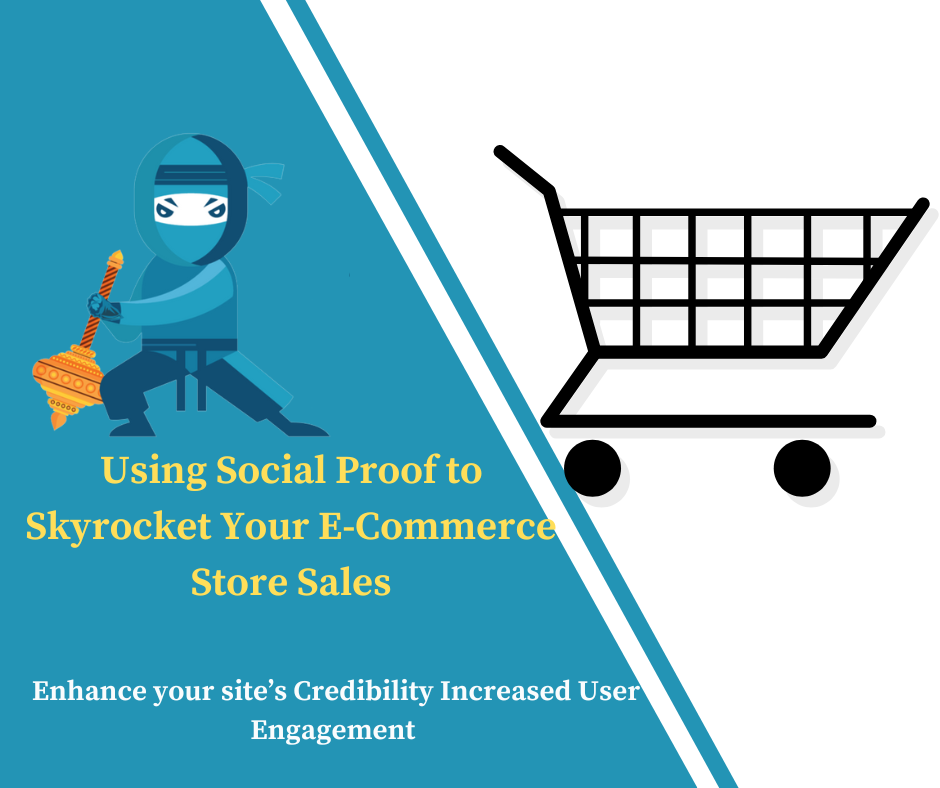Using Social Proof to Skyrocket Your E-Commerce Store Sales
In the fast-paced world of e-commerce, standing out can be a daunting task. However, leveraging social proof can significantly boost your store’s credibility and drive more sales. This article explores how using social proof can skyrocket your e-commerce store sales and offers actionable strategies to implement it effectively.
What is Social Proof?
Social proof is the psychological phenomenon where people rely on the actions and opinions of others to guide their behavior. In the context of e-commerce, social proof can come in various forms, such as customer reviews, testimonials, case studies, and social media mentions. It’s a powerful tool that builds trust and persuades potential customers to purchase by showcasing the experiences and opinions of others.
Why Social Proof is Crucial for E-Commerce Stores
Builds Trust and Credibility: In an online environment where customers can’t physically interact with products, social proof serves as a digital handshake, reassuring potential buyers about the legitimacy and quality of your offerings.
Increases Conversion Rates: Customers are more likely to make a purchase when they see that others have had positive experiences. Social proof provides the reassurance needed to nudge them towards completing a transaction.
Enhances Customer Experience: By highlighting customer reviews and testimonials, you make it easier for new customers to understand the value of your products, improving their overall shopping experience.
Encourages User-Generated Content: Social proof often involves user-generated content, such as photos and reviews, which can be leveraged to create a sense of community and engagement around your brand.
Also read: Quick Wins to Enhance Your Website Speed and Performance
Types of Social Proof to Implement
1. Customer Reviews and Ratings
Customer reviews and ratings are among the most direct forms of social proof. Positive feedback from previous buyers can significantly influence new customers’ purchasing decisions. To effectively use this type of social proof:
Showcase Reviews Prominently: Display customer reviews on product pages, the checkout page, and even on your homepage. Make sure they are easily accessible.
Encourage Reviews: Send follow-up emails asking customers to leave reviews after their purchase. Offer incentives, such as discounts or loyalty points, to encourage participation.
Respond to Reviews: Engage with customers by responding to their reviews, whether positive or negative. This demonstrates that you value feedback and are committed to improving.
2. Testimonials
Testimonials are written or video endorsements from satisfied customers or industry experts. They can add a personal touch and provide a compelling narrative about how your product or service has made a difference.
Feature Testimonials on Key Pages: Place testimonials on your homepage, product pages, and landing pages to build credibility.
Use Video Testimonials: Video testimonials can be more engaging and believable compared to text. They allow potential customers to see and hear real people sharing their positive experiences.
3. Case Studies
Case studies are detailed accounts of how your product or service has solved a problem for a customer or business. They provide an in-depth look at your product’s effectiveness and can be highly persuasive.
Create Engaging Case Studies: Develop case studies that highlight specific challenges and outcomes. Include data, before-and-after scenarios, and quotes from satisfied customers.
Share on Multiple Platforms: Promote your case studies through your website, email newsletters, and social media to reach a wider audience.
4. Social Media Mentions
Social media mentions serve as real-time endorsements from customers who share their experiences with your products or brand. These mentions can be a powerful form of social proof.
Display Social Media Feeds: Integrate social media feeds on your website to showcase real-time mentions and interactions. This adds a dynamic element to your site and highlights current customer satisfaction.
Encourage Sharing: Create campaigns that encourage customers to share their experiences on social media using specific hashtags or tagging your brand.
5. Influencer Endorsements
Influencer endorsements involve partnering with influencers who have a substantial following and credibility in your industry. Their endorsement can lend significant social proof to your brand.
Choose Relevant Influencers: Partner with influencers whose audience aligns with your target market. Their endorsement will carry more weight if it resonates with their followers.
Promote Collaborations: Share content from influencer partnerships on your website and social media to leverage their reach and credibility.
Implementing Social Proof in Your E-Commerce Strategy
1. Optimize Product Pages
Ensure that social proof elements, such as customer reviews and ratings, are prominently featured on your product pages. This visibility can help increase conversion rates by providing potential buyers with the reassurance they need.

2. Create a Trust-Building Environment
Use testimonials, case studies, and social proof elements to build a trustworthy and credible online presence. Displaying trust badges, security certificates, and social proof can reassure visitors about the legitimacy and safety of your e-commerce store.
3. Leverage User-Generated Content
Encourage customers to create and share content related to your products. This could include photos, reviews, or unboxing videos. Showcase this content on your website and social media channels to build community and authenticity around your brand.
4. Monitor and Respond
Keep an eye on customer feedback, reviews, and social media mentions. Respond to both positive and negative comments to demonstrate your commitment to customer satisfaction and to address any concerns promptly.
FAQ
What is social proof in e-commerce?
Social proof in e-commerce refers to the influence that the actions and opinions of others have on a potential buyer’s decision-making process. It includes elements such as customer reviews, testimonials, case studies, social media mentions, and influencer endorsements that help build trust and credibility for your online store.
How can social proof increase sales?
Social proof can increase sales by providing potential customers with reassurance and validation of your product’s quality and effectiveness. Positive reviews, testimonials, and endorsements from satisfied customers or influencers can significantly impact purchasing decisions, leading to higher conversion rates.
What types of social proof are most effective?
The most effective types of social proof include customer reviews and ratings, testimonials, case studies, social media mentions, and influencer endorsements. Each type provides different forms of validation and can be used strategically to enhance credibility and influence customer behavior.
How can I encourage customers to leave reviews?
Encourage customers to leave reviews by sending follow-up emails after a purchase, offering incentives such as discounts or loyalty points, and making the review process easy and convenient. Additionally, consider including review prompts on your website and in post-purchase communications.
Can social proof improve customer trust?
Yes, social proof can significantly improve customer trust. By showcasing positive experiences and endorsements from other customers, social proof provides social validation and reduces perceived risk, making potential buyers more confident in their decision to purchase from your store.
How often should I update social proof elements?
Regularly update social proof elements to ensure they remain relevant and current. This includes adding new customer reviews, featuring recent testimonials, and showcasing up-to-date social media mentions and influencer endorsements. Keeping social proof fresh helps maintain credibility and engages potential customers effectively.
Conclusion
Incorporating social proof into your e-commerce strategy can have a transformative effect on your sales. By leveraging customer reviews, testimonials, case studies, social media mentions, and influencer endorsements, you can build trust, enhance credibility, and drive more conversions. Implement these strategies to effectively use social proof and watch your e-commerce store sales skyrocket.








